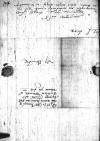List #1763
Ioannes TRESLER do Ioannes DANTISCUSGdańsk (Danzig), [1537]-11-03
| odebrano [1537]-11-06 Rękopiśmienne podstawy źródłowe:
Pomocnicze podstawy źródłowe:
| ||||||||
Tekst + aparat krytyczny + komentarzZwykły tekstTekst + komentarzTekst + aparat krytyczny
Reverendissimo in Christo Principi et Domino, domino
Salutem dico.
Attulit nuper ad me, Reverendissime Praesul, cancellarius Reverendissimae Dominationis Vestrae cf.
Ceterum vix credi potest, quantum me affecerint haec verba (pro vetere nostra benevolentia), coegerunt enim me repetere memoriam anteacti temporis et quodam modo praeteritae vitae rationem recensere. Quae, si cum praesenti vitae instituto (tametsi minime molesto) conferatur, longissimo dissidet intervallo, ut olim vixisse. Nunc autem, veluti
Hinc fit, quod in litteris scribendis vel in simili officii genere non modo segnior, verum etiam morosus,
De auctis fortunis et dignitate Reverendissimae Dominationi Vestrae ex animo gratulor. Deus Optimus Maximus una cum fortunis sua nos quoque gratia locupletiores efficiat.
Commisi pridem magistro
Reverendissimam Dominationem Vestram feliciss<ime> valere cupio optoque, ut me sua gratia prosequi non aspernatur.
Datae
Reverendissimae Dominationis Vestrae deditissimus

